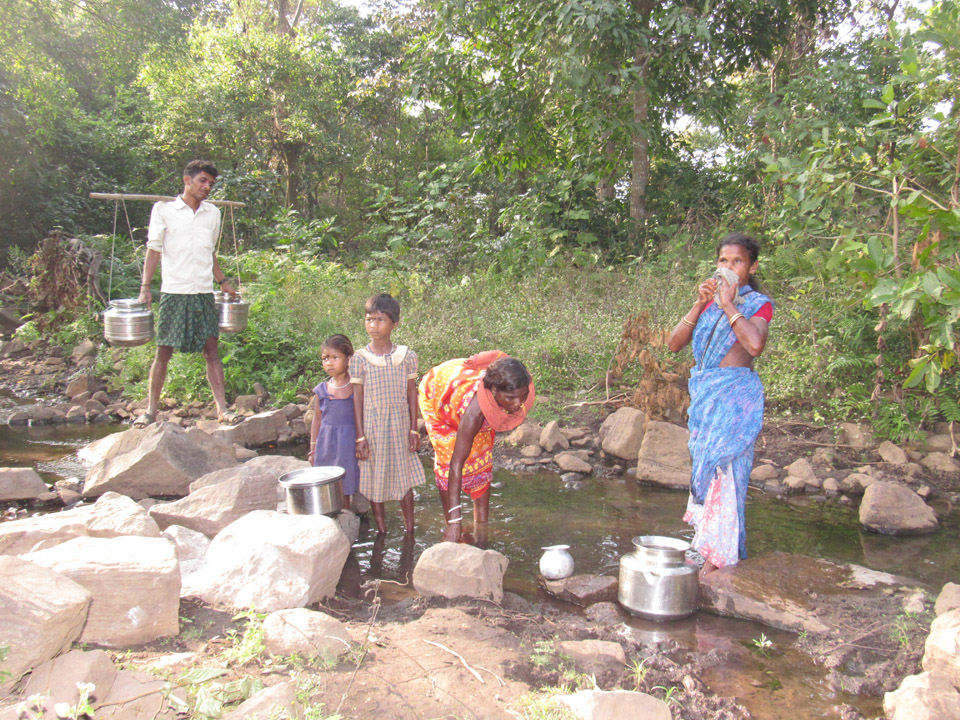Almost seven decades after India became a sovereign republic, several regions in Odisha still do not have a single government institution in the vicinity to assist the people in taking care of their needs and bring government services to their doorstep.
A case in point is some villages in the Papulur and Kapatuti panchayats of Chitrakonda, in Malkangiri.
There are several settlements like Bandamamudi, Kamlabanda, Parajaguda, Italanka, and Ganjeimala in Papulur panchayat and Pedalanka village in Kapatuti panchayat where the residents have no access to government services. Though these villages are located less than a hundred kilometres from the district headquarter town, the residents are not aware of the schemes that the government has launched for the people.
About 500 people belonging to 80 families live in these villages.
Notwithstanding the tall claims of the government of developing road networks in remote areas, one has to walk about 25 km of hilly terrain to reach these villages. There are two routes to reach them.
“You have to first get to Paluguda village in the Vejangiwada panchayat of Kalimela block. From there, you have to walk around 15 km through a forest to reach the villages. Or else, you may first go to Nagulur of Papulur panchayat from where you have to walk 25 km through dense forest to reach these settlements,” said a resident.
Most of the residents here belong to the Kandadora, Kandareddy, Paraja and Kondh tribes. They speak a tribal dialect mixed with Telugu. Their main source of livelihood is poultry farming and they raise crops like ragi, pearl millet, kandula and suan using a shifting cultivation method. The produce is sold at the nearest weekly markets at Vejangiwada and Petal.
These tribals mainly live on porridge prepared from ragi, suan and rice. Very often, they have to survive on roots and tubers of wild plants. They use stream water for all purposes including drinking and bathing and for their farm animals. In the summer season when the streams dry up, the tribals dig small pits and manage with pit water.
As yet, there are no anganwadi centres, schools or health centres in these villages and the residents are ignorant about government housing schemes like Indira Awas Yojana, Pradhan Mantri Awas Yojana and Biju Pucca Ghar Yojana. Elderly persons don’t get old age pensions and the kids suffer from malnutrition due to lack of food.
None of the villagers has ever visited a government health centre. The villagers depend on quacks who treat the patients using roots and shrubs collected from the jungles.
The villagers said the cattle can’t be used to plough the farmland as it is uneven. So, they tie a farm tool to a piece of log and plough the surface manually. They don’t know about chemical fertilisers and use compost for cultivation. The yield they get from the land is first offered to the presiding deity of the village. It is believed that the villagers would earn the wrath of the goddess if the first harvest is not offered to her.
Wild animals always pose a threat to the lives of the villagers. So, they stay indoors after sunset and travel in a group to collect water, forest produce and firewood. They collect firewood at one time for the whole year.
Villagers are completely unaware of how to approach the administration to avail the schemes meant for them. Some years ago, a villager said, some officials came to the area to set up a school. A patch of land was demarcated for the purpose but since then no headway has been made in the project. The children remain deprived of education, said Balaya Markel and Kela Apparao of Bandamamudi village. Similar sentiments were echoed by Chinnabhai Bari and Banagarama Papal, two tribals of Kelabahaya and Pedalanka villages.
The tribals want the administration to build a road under the Mahatma Gandhi National Rural Employment Guarantee Act (MGNREGA) so that they can get employment opportunities.
Similarly, they would like water to be supplied through pipes to the homes in the villages, said Kantamachal of Pedalanka village.
When contacted, the Chitrakonda block development officer (BDO) Loriman Kharsel, who has taken up his post recently, acknowledged the poor development in these hilltop villages.
“There is no dearth of funds with the administration, but it is difficult to undertake development projects in the absence of roads,” Loriman said.
Apart from the villages of these two panchayats, there are many other villages in Chitrakonda block where the residents don’t get government benefits due to lack of proper roads, he added.
“I feel sad at the plight of the residents and am trying to do my best to help out the people,” the BDO said.
NRUSINGH CHARAN MOHANTY, OP
